REVIEW: Inception
Jul0
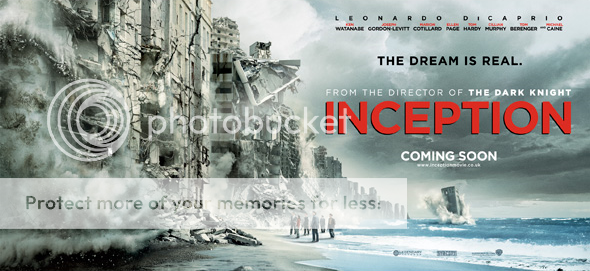
Inception poster ©2010 Warner Brothers, all rights reserved.
“What is the most contagious parasite?” asks Leonardo DiCaprio’s character Mr. Cobb in the early moments of Inception. “An idea.” From the tiniest seed, it spreads like a virus, he explains. This is what makes it vulnerable to manipulation and theft. In many ways, the same could be said for Inception itself. Bending time, delving layers of dreams within dreams, shifting between reality and fantasy, the movie is instantly contagious. By the final shocking scene, when four concomitant worlds finally weave together in a breathlessly taut salvo, one is left downright feverish. It also happens to be one of the smartest, best-written, enigmatic additions to the typically content-light action genre. ScriptPhD.com’s full review of Christopher Nolan’s chef d’œvre under the “continue reading” cut.
REVIEW: “Splice” (includes VIDEO interview with cast + crew)
Jun1
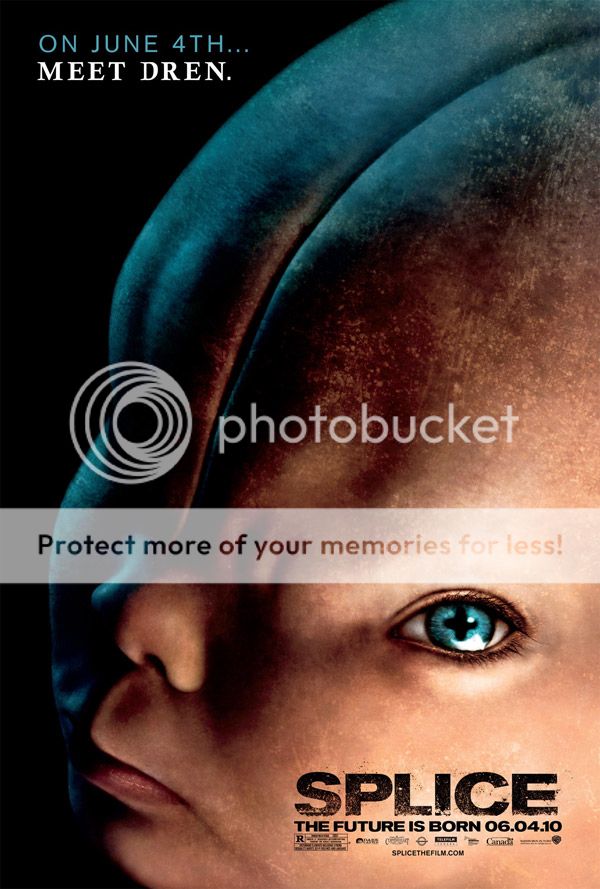
Splice ©2010 Warner Brothers Entertainment, all rights reserved.
About a week and a half ago, scientists achieved a remarkable evolutionary stepping stone in the technological holy grail of eventually engineering synthetic life. Nicknamed ‘Synthia’ by her experimental progenitors, the latest discovery is a viable, self-propagating yeast cell hosting a bacterial Mycoplasma mycoides genome (consisting of non-biological DNA) purely composed in the laboratory. In eerily apt timing, Splice, a new science fiction thriller premiering this week, explores the scientific ramifications and bioethical morass encompassing the creation of a human-animal hybrid by a rogue superstar genetics couple. Under the “continue reading” cut, ScriptPhD.com’s review of Splice, discussion of the expanding frontiers of genetic engineering, and a special video interview with the director/writer, producer and stars of the film.
INTERVIEW: Engineering Professor and Caprica Science Consultant Malcolm MacIver
Mar4
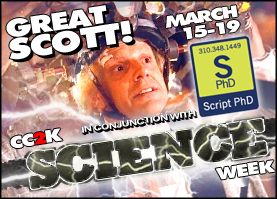
ScriptPhD.com is extraordinarily proud to present our first ever Science Week! Collaborating with the talented writers over at CC2K: The Nexus of Pop Culture and Fandom, we have worked hard to bring you a week’s worth of interviews, reviews, discussion, sci-fi and even science policy. We kick things of in style with a conversation with Professor Malcolm MacIver, a robotics engineer and science consultant on the SyFy Channel hit Caprica. While we have had a number of posts covering Caprica, including a recent interview with executive producer Jane Espenson, to date, no site has interviewed the man that gives her writing team the information they need to bring artificial Cylon intelligence to life. For our exclusive interview, and Dr. MacIver’s thoughts on Cylons, smart robotics, and the challenges of future engineering, please click “continue reading.”
REVIEW: Hubble IMAX—Editor’s Selection
Mar1

Hubble 3D IMAX poster ©2010 Warner Brothers Pictures, all rights reserved.
The Hubble Space Telescope is the world’s first observatory that actually orbits—you guessed it—through outer space. Over the last decade, Hubble has captured some of the deepest and most detailed images of our universe. All those recent headlines about exoplanets: those discoveries come from Hubble. Scientists viewing pictures of light projected from stars over 13 billion years ago (almost at the origin of the universe): that’s Hubble, too. Hubble 3D documents the 2009 mission by the crew of the Shuttle Atlantis to make vital repairs to one of mankind’s most expensive, and significant, science projects. There would be no second chances. If the mission had failed, Hubble would be just another piece of junk orbiting above the earth, like my Direct TV satellite and Elvis’s body. The tension is real, the suspense extraordinary, and the imagery? Out of this world. And fortunately for terrestrial audiences, the entire mission was captured by the crew and director Toni Myers on some of the most breathtaking, brave film ever recorded. We are proud to make Hubble 3D an official ScriptPhD.com Editor’s Selection.
Video: ScriptPhD Interviews the Science Advisor of ‘Fringe’
Feb0
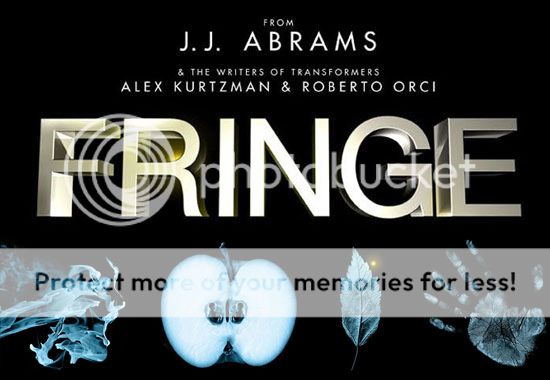
Fringe images ©2008 FOX Broadcasting Corporation, all rights reserved.
ScriptPhD.com’s coverage of Comic-Con 2009 included an interesting panel entitled Mad Science: The Science Behind Science Fiction, which consisted of a panel of top science fiction shows Eureka, Battlestar Galactica, Eureka, Caprica and Fringe. There, we met Dr. Ricardo Gil da Costa, a neurobiologist who is one of the official science advisors to the writers of Fringe. We recently had the opportunity to visit Dr. Gil da Costa on location in his laboratory at the Salk Institute for Biological Studies in San Diego, CA. We sat down to talk about his science, what it’s like to be “on-call” for one of the biggest hit shows on television, how the writers use his knowledge and integrate it into the show, and more broadly, how creatives in the entertainment industry can best utilize the skills of research scientists as they integrate more sophisticated material into their scripts. To watch the video, please click “continue reading.”
REVIEW: Caprica (includes interview with head writer Jane Espenson)
Jan2
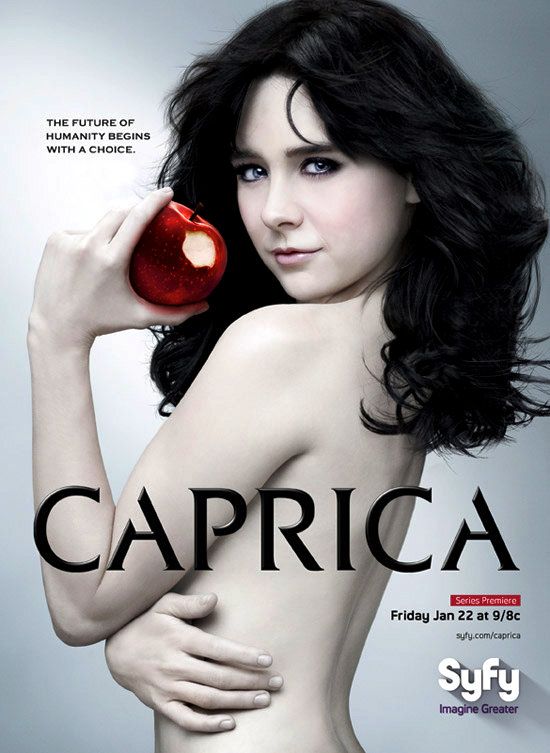
Caprica poster and all images ©2010 NBC Universal, all rights reserved.
No one has been more excited about the premiere of Battlestar Galactica prequel Caprica than ScriptPhd.com. We eagerly joined the cast and crew of both shows last May during their joint panel at the Los Angeles Paley television festival. We were also one of the first sites to review the Caprica 2 hour pilot. And now, at long last, one of the most anticipated sci-fi prequels ever will premiere on the SyFy Channel this Friday. ScriptPhD.com’s Bryy Miller reviews the first three episodes and talks about the show’s early conceptualization and long-term promise. We are also extraordinarily fortunate and proud to bring you an Editor’s interview with series executive producer and show runner Jane Espenson, in which she talks about what we can expect from Caprica. Please click “continue reading” for full content.
ScriptPhD + Discovery Channel Giveaway: Join the MythBusters at Comic-Con!
Jan50

The ScriptPhD gets down and geeky with MythBusters Grant Imahara and Kari Byron at Discovery's recent 25th Anniversary party in Pasadena, CA.
ScriptPhD.com was delighted to join Discovery Channel in celebrating 25 years of science, specials, animals, crazy experiments, and educating the public viewing audience last week in Pasadena, CA. There, we met up with the likes of the MythBusters, Animal Planet, The Science Channel and more to get scoop for our fans and be a proud part of the best pure science television programming on air today. To help Discovery Channel celebrate, ScriptPhD.com is announcing a giveaway and fan contest that you don’t want to miss, especially if you’re a MythBusters fan! For more photographs, party coverage and details on our contest, please click “continue reading”.
REVIEW: The Book of Eli (Bleak Chic with a Christian Twist)
Jan1
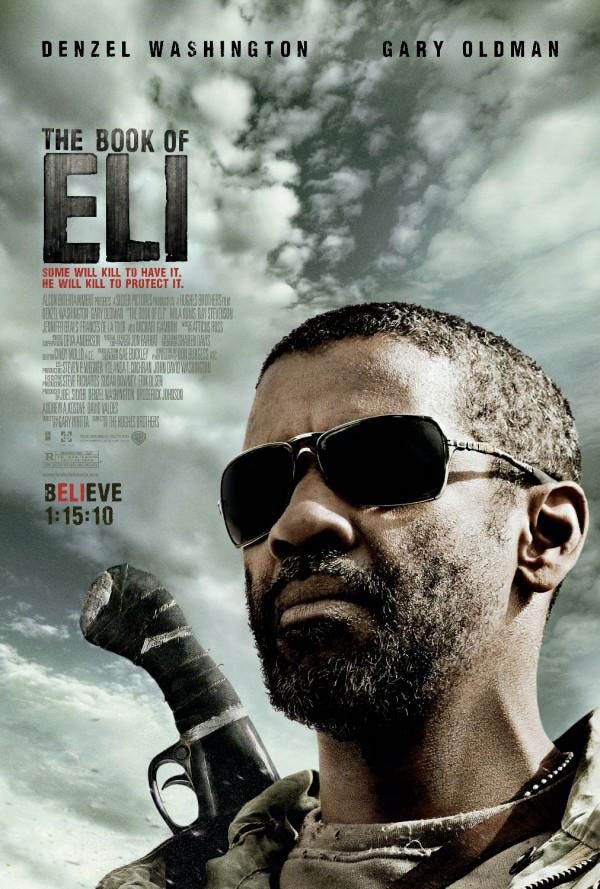
The Book of Eli film poster ©2010 Warner Brothers Pictures, all rights reserved.
Picture this: a mysterious Man with No Name comes into a tiny desert town that’s dominated by a manipulative and powerful bossman. He has something the bossman wants and won’t give it up – and No Name is an almost supernaturally powerful fighter; you really don’t want to mess with him. Before the battle between Good and Evil is over, the Man with No Name has decimated the bossman’s thug-army and brought the evil leader low, the dusty little settlement is either burned to the ground or better off than before he arrived, and off he goes, continuing his mysterious journey – always in motion, never at peace. Except for a tie-‘em-up ending that’s tacked on to the back of The Book of Eli, that’s pretty much what you’ve got here: a post-apocalyptic tale of the mysterious hero vs. the bully prince, just like an old Sergio Leone/Clint Eastwood spaghetti western. Just replace Eastwood with Denzel Washington, replace the Old West with the near future after a global catastrophe, cast a painfully over-the-top Gary Oldman as the Bad Boss, give newcomer Mila Kunis the inevitable pretty girl/spunky sidekick role, and you’re golden. Or at least should have been. Unfortunately for the viewing audience, there’s more Sergio Leone than Cormac McCarthy in this ponderous and unconvincing post-apocalyptic allegory. For a full review, please click “continue reading”.
REVIEW: Avatar (Editor’s Selection)
Dec7
Avatar poster and all images ©2009 20th Century Fox. All rights reserved.
There are certain films that outlive their theatrical releases to become evolutionary stepping stones of filmmaking. Long after the popcorn has been munched and the Oscars handed out, these movies stand the test of time and usher in the cinematic equivalents of geologic Eras. D.W. Griffith’s The Birth of a Nation redefined the beauty of silent imagery. Alan Crosland’s The Jazz Singer integrated sound and heralded the rise of “the talkie.” Orson Welles’s Citizen Kane became a hallmark of big-budget studio genius. And every sci-fi film of the last forty years owes debt to the standard set by Stanley Kubrick’s 2001: A Space Odyssey. And then there is Avatar. That this film, with fifteen years of creative development, four years of full-time work, and endless hype, was bound to be good seems like manifest destiny. But it doesn’t just live up to its hype—it exceeds it. James Cameron has reinvented visual possibilities, perfected multi-layered storytelling and provided a service to audiences and filmmakers. He has transitioned us into the next big cinematic Era: 3D. Avatar is a ScriptPhD.com Editor’s Selection. For a full review, please click “continue reading”.


















Why I Hate FlashForward: A Dissenter’s Opinion
Jan3
FlashForward: Illogicalifragilisticexpialidocious
FlashForward logo ©2009 ABC Productions, all rights reserved
It goes without saying that pretty much every work of fiction begins with the “what if” question. “What if I knew the world was ending tomorrow?” “What if my wife was secretly plotting to kill me?” “What if this article wins me the Pulitzer?” What separates the great (or simply enjoyable) work from that which cannot be accepted is a second level of consideration: actually thinking about the “what if” and seeing if it has any real value, any weight, beyond that first fleeting thrill that comes with the High Concept. FlashForward, the ABC TV series or the 1999 novel by Robert J. Sawyer upon which it is loosely, loosely based, is a perfect example of exactly that: the cool but ultimately unsatisfying idea that really can’t stand the stress of storytelling. Because hiding behind the spotty acting and cliché characters—on screen or in print—the whole concept has a serious problem: it just doesn’t make a lick of sense. Under the “continue reading” jump, an analysis of the logic and science flaws of FlashForward.